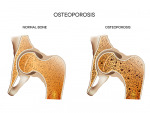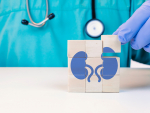Displaying items by tag: department of medicine
UAB researchers make a case for utilizing telehealth technologies in the care of injured rural patients stating that teletrauma can improve access to trauma care for rural patients.
Tagged under
Since 1985, the Coronary Artery Risk Development in Young Adults study has examined the factors that contribute to the development of cardiovascular disease to better understand the natural history of cardiovascular disease over the adult life course.
Tagged under
These results add an additional, mechanistic aspect to further explain how the decades-old blood pressure medication verapamil can preserve beta cell function in Type 1 diabetes patients by affecting the hormone insulin-like growth factor 1.
Tagged under
The study, funded by the Patient-Centered Outcomes Research Institute, will compare two pathways of post-fracture patient care.
Tagged under
Some PD-1+CXCR5+CD4+ T cells will become germinal center-Tfh cells that are essential for B cells to become high-affinity antibody-producing cells. Others do not take that path, instead becoming memory T cells.
Tagged under
$46 million awarded by NIH to UAB and partners allows researchers to continue following participants enrolled in the national Multicenter Osteoarthritis Study.
Tagged under
The newly introduced kidney function equation has value in predicting heart failure comparable to the old equation but may reduce racial disparities by improving access to heart failure therapy among Black heart failure patients.
Today the National Institutes of Health has announced that UAB’s own Jeanne Marrazzo, M.D., has been selected to succeed Anthony Fauci, M.D., as the next director of NIH’s National Institute of Allergy and Infectious Diseases (NIAID) this fall.
Tagged under
IN8bio has opened a new Birmingham facility, a 10,000-square-foot advanced research and development laboratory in the Martin Biscuit Building at Pepper Place.
Tagged under
As one of only five universities selected, UAB joins the NIH’s first major program to address how structural and institutional factors of persistent poverty relate to cancer.
Tagged under
The baby boy, born in late May 2023, is the first baby born from a uterus transplant outside of a clinical trial and UAB’s first baby from its uterus transplant program.
Tagged under
- release
- university of alabama system
- uab medicine
- school of medicine
- transplantation
- comprehensive transplant institute
- department of surgery
- division of transplantation
- department of obstetrics and gynecology
- division of gynecologic oncology
- division of maternal fetal medicine
- division of reproductive endocrinology and infertility
- department of radiology
- department of pathology
- department of medicine
- division of infectious diseases
- department of pediatrics
- womens history
The future has much potential as the REACH Up and Out program hopes to continue to make an impact on the lives of Black women in the Deep South.
Tagged under
Chronic obstructive pulmonary disease patients with type 2 inflammation saw rapid and sustained improvements in their disease after treatment with the monoclonal antibody dupilumab.
Tagged under
Live HealthSmart Alabama is continuing to make good health simple with its completion of the new Bush Hills Connection Complex and Urban Garden.
Tagged under
UAB researchers conducted a study including approximately 20,000 left ventricular assist device recipients and found that women had worse clinical outcomes compared with men across social and clinical subgroups of interest.
The Healthy Happy Kids program focuses on a different health and physical activity topic each week, encouraging children to make healthier choices.
Tagged under
The Fulbright U.S. Student Program provides grants to study, teach and conduct research in more than 160 countries.
Tagged under
UAB experts discuss changes women should be aware of as their bodies mature and what exams they should receive during different time periods.
Tagged under
Knowledge of this previously unrecognized mechanism may aid therapy for patients with interleukin-6 signaling mutations and hyper-IgE Syndrome, or HIES.
Tagged under
The Healthy Happy Kids program focuses on a different health and physical activity topic each week, encouraging children to make healthier choices.
Tagged under



















